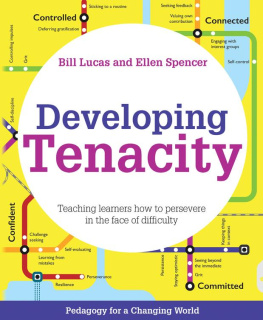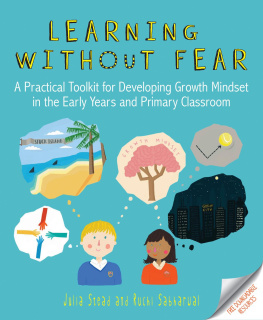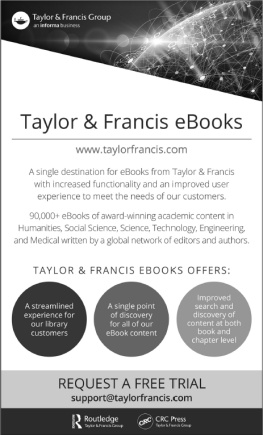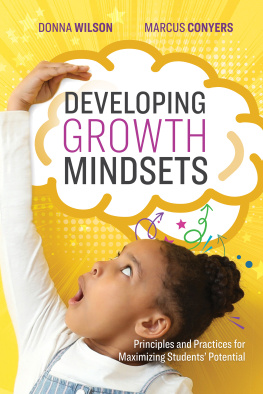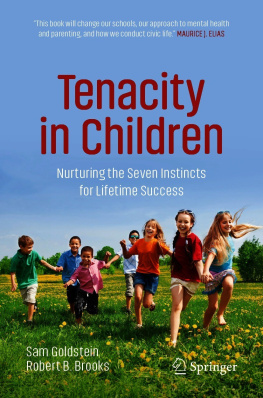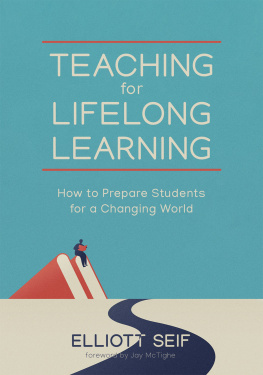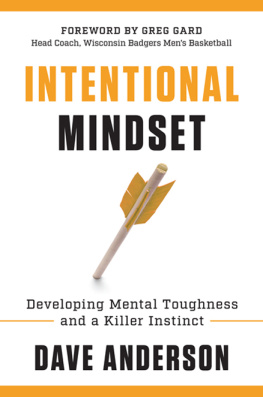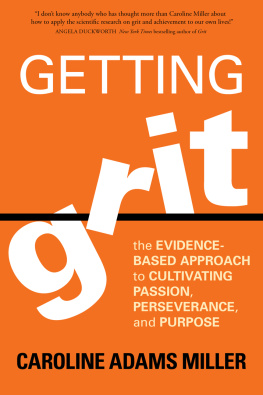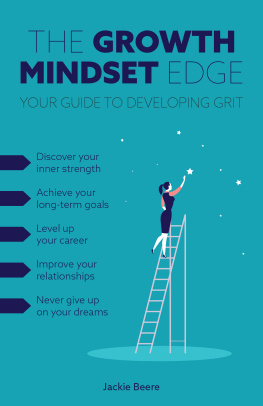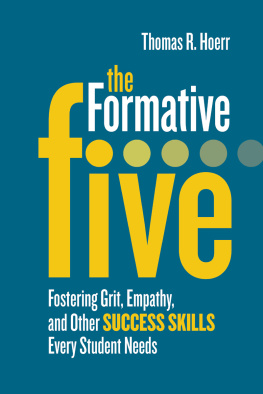Praise for Developing Tenacity
Bill Lucas and Ellen Spencers Developing Tenacity is a joy to read above all because it argues for both the rigour of disciplinary knowledge and a robust approach to the development of character. Also a pleasure to see is its combination of scholarship with practical application, just the kind of thing that schools will find useful.
Julian Astle, Director of Creative Learning and Development, RSA
Connectedness, resilience and courage are core attributes of what it is to be a successful learner. The concept of tenacity developed by Bill Lucas and Ellen Spencer gives us the underpinning research, brings thinking about capabilities together coherently and offers an array of practical ideas for schools.
Philip Grutzner, Principal, Carey Baptist Grammar School, Melbourne
It is vital that schools develop tenacious learners and I strongly welcome this authoritative book on the subject of tenacity. Wellington College is delighted to have its work featured as a case study.
Carl Hendrick, Head of Learning and Research, Wellington College and author of What Does This Look Like in the Classroom?
Developing Tenacity is an inspiring read. As well as being an academic study into tenacity, its also a pragmatic guide for schools on how to apply its principles. This book is the ideal companion for all educators, regardless of the sector they belong to.
Jon Murphy, Head Teacher, Llanfoist Fawr Primary School
Students psychological experience of learning and school is an important factor in their academic success. Developing Tenacity offers an array of practical ideas for educators on how to create environments that nurture the natural curiosity and drive to learn with which people are born.
Lisa Quay, Executive Director, Mindset Scholars Network
There is mounting evidence for the importance of developing capabilities like tenacity in young people if they are to get on in life. Bill Lucas and Ellen Spencer draw on a wide array of evidence to show how this can be done in schools today and develop a toolkit for a more stimulating learning experience.
Ingrid Schoon, Professor of Human Development and Social Policy, UCL Institute of Education
An enterprising curiosity, an undefeatable spirit and unflagging tenacity are hallmarks of Round Square schools. Developing Tenacity perfectly speaks to our values and, through its compelling evidence and practical guidance, shows how all schools can develop tenacious students.
Rachael Westgarth, Chief Executive, Round Square schools
Our huge thanks to:
All the pioneering school leaders who have contributed school case studies, including: Jon Murphy, Llanfoist Fawr Primary School; Oli de Botton, Ed Fidoe and Peter Hyman, School 21; Lee Hill, Thoresby Primary School; and Sarah Donarski, Iain Henderson, Carl Hendrick, Ian Morris, Carl Oakman, Matthew Oakman and Guy Williams, Wellington College.
All the educational thought leaders whose work contributed to wider case studies, including: Ron Berger, Expeditionary Learning; Nicky Morgan, former UK secretary of state for education; Lisa Quay, Mindset Scholars Network; and Rachael Westgarth, Round Square schools.
All the thought leaders on whose shoulders we stand, including: Ron Beghetto, Ron Berger, Art Costa, Guy Claxton, Mihaly Csikszentmihalyi, Angela Duckworth, Carol Dweck, K. Anders Ericsson, Charles Fadel, John Hattie, James Heckman, Peter Hyman, Bena Kallick, Tim Kautz, Robert Marzano, Michael Quinn Paton, David Perkins, Ron Ritchhart, Sir Ken Robinson, Martin Seligman, Paul Tough, Dylan Wiliam and David Yeager.
The Comino Foundation for generously supporting our work to develop young peoples personal capabilities at the Centre for Real-World Learning.
Contents
Ensuring that all people have a solid foundation of knowledge and skills must therefore be the central aim of the post-2015 education agenda. This is not primarily about providing more people with more years of schooling; in fact, thats only the first step. It is most critically about making sure that individuals acquire a solid foundation of knowledge in key disciplines, that they develop creative, critical thinking and collaborative skills, and that they build character attributes, such as mindfulness, curiosity, courage and resilience.
Andreas Schleicher and Qian Tang, Education Post-2015: Knowledge and Skills Transform Lives and Societies (2015, p. 9)
Changing roles for schools
Across the world there is a great shift taking place. Where once it was enough to know and do things, our uncertain world calls for some additional learning. We call them capabilities. Others call them dispositions, habits of mind, attributes or competencies, words we find very helpful. Some refer to them as non-cognitive skills, soft skills or traits, none of which we like given, respectively, their negative connotations, tendency to belittle what is involved and association with genetic inheritance.
Our choice of capabilities is pragmatic. A country in the northern hemisphere like Scotland is actively using the term, as is Australia at the opposite end of the earth. If we had to choose a phrase to sum up our philosophy it would be dispositional teaching that is to say, the attempt specifically to cultivate in learners certain dispositions which evidence suggests are going to be valuable to them both at school and in later life.
We know that the shift is underway for four reasons:
- One of the guardians of global comparative standards, PISA, is moving this way. In 2012, as well as tests for 15-year-olds in English, maths and science, they introduced an innovative domain called creative problem-solving. This became collaborative problem-solving in 2015, global competence in 2018 and will become creative thinking in 2021.
- Researchers the world over are beginning to agree on the kinds of capabilities which do, and will, serve children well at school and in the real world. Well explore this increasingly consensual list later on, but for now we want to share just some of the key thinkers to reassure you that you are in good company: Ron Berger, Guy Claxton, Art Costa, Anna Craft, Angela Duckworth, Carol Dweck, K. Anders Ericsson, Charles Fadel, Michael Fullan, Howard Gardner, Leslie Gutman, Andy Hargreaves, John Hattie, James Heckman, Lois Hetland, Bena Kallick, Tim Kautz, Geoff Masters, David Perkins, Lauren Resnick, Ron Ritchhart, Sir Ken Robinson, Andreas Schleicher, Ingrid Schoon, Martin Seligman, Robert Sternberg, Louise Stoll, Matthew Taylor, Paul Tough, Bernie Trilling, Chris Watkins, Dylan Wiliam and David Yeager. Wed include our own work in this field too.
- Organisations and well-evidenced frameworks are beginning to find common cause with the idea of capabilities. The Assessment and Teaching of 21st Century Skills project, Building Learning Power, the Center for Curriculum Redesign, the Expeditionary Learning Network, the Global Cities Education Network, Habits of Mind, New Pedagogies for Deeper Learning, Partnership for 21st Century Learning and the Skills4Success Framework are just a few examples. Wed include our own Expansive Education Network here too.
- Inspirational leaders across the world are very gradually showing us that you can powerfully embed capabilities into the formal, informal and hidden curriculum of schools, if you have a mind to do so. Here are six examples: Collegi Montserrat in Spain, Hellerup School in Denmark, High Tech High in the United States, School 21 and Thomas Tallis School in England and Rooty Hill High School in Australia. Youll doubtless have your own favourites to add in. We love these schools and their courageous teachers. Throughout the series, we hope that their stories and our grounded practical advice will serve to ensure that hundreds of thousands of schools across the world see the value of systematically cultivating capabilities

